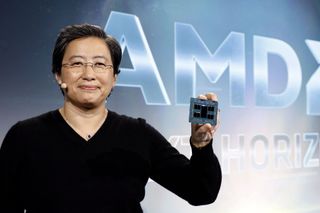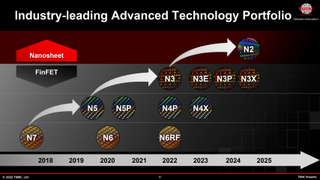AMD CEO to Negotiate 2nm, 3nm Chip Supplies With TSMC
Head of AMD to talk about beyond-2024 collaboration with TSMC.

Lisa Su, AMD's chief executive, and other company C-level execs plan to visit Taiwan in late September – early November to discuss collaboration with local partners. Among the companies, AMD's management intends to meet are Taiwan Semiconductor Manufacturing Co., chip packaging specialists, and big PC makers.
Lisa Su plans to discuss future collaboration with TSMC's chief executive CC Wei during her visit. Among the topics is the usage of TSMC's 'N3 Plus' fabrication node (probably N3P) and N2 (2nm-class) manufacturing technology, reports DigiTimes citing sources with knowledge of the matter. In addition, the two companies' chief executives will discuss plans for upcoming orders, which include technologies that are either available or set to become available in the short-term future.
AMD's impressive success in recent years is enabled mainly by TSMC's ability to produce chips in high volume using its highly competitive process technologies. To continue its spree of screaming success, AMD must ensure sufficient allocation at TSMC and early access to the foundry's latest process design kits (PDK). TSMC will start volume production of chips on its N2 node sometime in the second half of 2025, so it is about time for AMD to start talking about the usage of N2 for its 2026 products and beyond.

In addition to advanced TSMC's semiconductor manufacturing technologies, AMD's future success will depend on advanced chip packaging technologies as the company (like other designers of chips) will extensively use multi-chiplet chip packaging technologies.
So, AMD's Lisa Su will also discuss collaboration with TSMC, Ase Technology, and SPIL on the advanced packaging front. At present, AMD already uses TSMC's 3D SoIC (system on integrated chips) platform, such as CoWoS (chip on wafer on the substrate) packaging technology, as well as Ase's fan-out embedded bridge (FO-EB) packaging method for some of its products, according to DigiTimes. However, in the future, usage of innovative packaging will only increase, which is why AMD needs to negotiate allocation and prices well in advance.
In addition to longer-term plans, AMD's C-level executives will discuss more down-to-earth things like supplies of sophisticated printed circuit boards (PCBs) used for its CPUs (which is one of the factors that restrains AMD server CPU shipments) as well as provisions of Ajinomoto build-up films (ABF) for these PCBs with partners like Unimicron Technology, Nan Ya PCB and Kinsus Interconnect Technology.
Finally, AMD's executives will meet with Asus and Acer, two large PC makers from Taiwan with close ties with the American chip designers, and ASMedia, which develops chipsets for the red company.
Stay on the Cutting Edge
Join the experts who read Tom's Hardware for the inside track on enthusiast PC tech news — and have for over 25 years. We'll send breaking news and in-depth reviews of CPUs, GPUs, AI, maker hardware and more straight to your inbox.

Anton Shilov is a Freelance News Writer at Tom’s Hardware US. Over the past couple of decades, he has covered everything from CPUs and GPUs to supercomputers and from modern process technologies and latest fab tools to high-tech industry trends.
-
HideOut How is this headline worthy? If they were not in negotiations for future tech they'd be the biggest idiots on the planet. Its kina a "no <Mod Edit> sherlock" statement.Reply -
DougMcC ReplyHideOut said:How is this headline worthy? If they were not in negotiations for future tech they'd be the biggest idiots on the planet. Its kina a "no <Mod Edit> sherlock" statement.
They could also have been found to be in negotiations with a different foundry, but weren't. Confirmation of no change is important to the industry, even if change would be more dramatic. -
waltc3 "AMD's impressive success in recent years is enabled mainly by TSMC's ability to produce chips in high volume using its highly competitive process technologies."Reply
Partially true. AMD's success also rests on its ability to innovate and design unique architectures that it can produce using TSMC's fabs and AMD's so-far unequaled ability to execute on its plans and actually produce and ship its products on schedule. Like with most everything else, Intel sat back and allowed TSMC and AMD to fly right past them. It's that old bugaboo--monopolistic thinking, that only works when you are a monopoly, that has set Intel back so far. AMD otoh has never been in a position to develop a monopolistic attitude--it always been pedal-to-the-metal competition for AMD. Watching Intel struggle to compete is nothing if not entertaining. I think this time, though, Gelsinger knows that AMD has no intention of slowing down--as was the unfortunate case with AMD post Opteron. -
JayNor As long as we're guessing ... AMD could be stopping by to talk to MediaTek about a wifi7 chiplet, since AMD doesn't appear to have their own IP.Reply -
zx128k Intel are going to be ahead of TSMC in the coming years. AMD need access to the most cutting edge if they have any hope.Reply -
waltc3 I don't see any news here. Just someone who for some reason doesn't think AMD knows what to do with itself...;) Interesting to note that while most news centers around the products and tech AMD is shipping today, much of Intel commentary centers around vaporware shipping at some future date. That could be because that is what 90% of Intel PR is centered on these days. Intel FABs have been struggling to catch up with TSMC for the last five years, unsuccessfully, too, I might add. But some people can't let go of the Intel myth, for some reason--much like Apple's fan base. The central problem for Intel for the last several years and moving forward is its corporate structure. Intel is still trying to learn how to compete with another very strong and very competitive company--Intel's entire organization is built on monolithic, monopolist thinking, because that's what Intel was for the decade prior to Zen2 from AMD. OTOH, AMD is a lean, mean engineering machine that has never known anything but raw competition in its history. Both companies will work and produce according to their corporate structures, imo. I do not see Intel's current CEO as especially apt as he was pulled from Intel's halcyon, monopolist days, which have long passed.Reply -
zx128k Reply
Intel have partnered with ASML to bring the next generation to market. Intel’s production manufacturing with High-NA EUV is beginning in 2025.waltc3 said:I don't see any news here. Just someone who for some reason doesn't think AMD knows what to do with itself...;) Interesting to note that while most news centers around the products and tech AMD is shipping today, much of Intel commentary centers around vaporware shipping at some future date. That could be because that is what 90% of Intel PR is centered on these days. Intel FABs have been struggling to catch up with TSMC for the last five years, unsuccessfully, too, I might add. But some people can't let go of the Intel myth, for some reason--much like Apple's fan base. The central problem for Intel for the last several years and moving forward is its corporate structure. Intel is still trying to learn how to compete with another very strong and very competitive company--Intel's entire organization is built on monolithic, monopolist thinking, because that's what Intel was for the decade prior to Zen2 from AMD. OTOH, AMD is a lean, mean engineering machine that has never known anything but raw competition in its history. Both companies will work and produce according to their corporate structures, imo. I do not see Intel's current CEO as especially apt as he was pulled from Intel's halcyon, monopolist days, which have long passed.
EUV 0.55 NA has been designed to enable multiple future nodes beginning in 2025 as the industry’s first deployment, followed by memory technologies at similar density.
Industry watchers said Intel will likely use the new machines to make more advanced 2 nm chips.
The latest EUV machine’s technology is more advanced than the equipment with which top foundry player Taiwan Semiconductor Manufacturing Co. produces chips via its 3-nanometer chip processing node.
Thus, AMD need access to the most cutting edge from TSMC. I hope what I said makes sense now. -
TJ Hooker Reply
Stating that the equipment Intel will be using in 2025 (at the earliest) will be more advanced than the equipment TSMC is using today (and for some time already) doesn't seem particularly impressive. TSMC will be moving to high NA machines in the future as well.zx128k said:Intel have partnered with ASML to bring the next generation to market. Intel’s production manufacturing with High-NA EUV is beginning in 2025.
EUV 0.55 NA has been designed to enable multiple future nodes beginning in 2025 as the industry’s first deployment, followed by memory technologies at similar density.
Industry watchers said Intel will likely use the new machines to make more advanced 2 nm chips.
The latest EUV machine’s technology is more advanced than the equipment with which top foundry player Taiwan Semiconductor Manufacturing Co. produces chips via its 3-nanometer chip processing node. -
zx128k Reply
The thing is, Intel is working with ASML. They are partners developing this new process. Intel will be first to be able to manufacture under the new process. TSMC buys their lithography machines from ASML, they too are partners.TJ Hooker said:Stating that the equipment Intel will be using in 2025 (at the earliest) will be more advanced than the equipment TSMC is using today (and for some time already) doesn't seem particularly impressive. TSMC will be moving to high NA machines in the future as well.
AMD have to go to TSMC for chip manufacture, they have to fight with Apple and the rest for cutting edge chips. Apple have booked close to 90% of TSMC's 3nm production. Apple is gradually monopolizing TSMC.
Without Apple as a predictable, high volume, and demanding client, it is unlikely that TSMC would have been able to catch up to Intel on advanced node semiconductor manufacturing.
At the moment, Apple is a priority for TSMC. When there are huge price increases, TSMC gives Apple huge subsidies. This means that Apple and the other brands can not be on a level playing field.
TSMCs 3nm yeild is just 55%. TSMC 3nm chip production can’t keep up with Apple demand.
Most Popular




